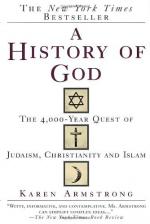|
This section contains 650 words (approx. 2 pages at 400 words per page) |

|
The God of the Mystics Summary and Analysis
In chapter 7, Karen Armstrong explains that the idea of a personal God was developed by all three of the monotheistic religions as a necessary stage of moral development in enshrining the values of society and thus conformance to its mores. Nevertheless, an inherent danger in a personal God leads adherents of a religion to imbue in the Deity their own prejudices and limitations. The history of the emergence of the Judaic scriptures can be interpreted as the refinement and later abandonment of the tribal and personalized Yahweh, while Christianity attempted to qualify the highly personalized cult of God incarnate by introducing the doctrine of the transpersonal Trinity. Likewise the Muslims experienced problems with the passages in the Koran where God was described as exhibiting human acts such as "hearing" and judging.
All three...
(read more from the The God of the Mystics Summary)
|
This section contains 650 words (approx. 2 pages at 400 words per page) |

|




